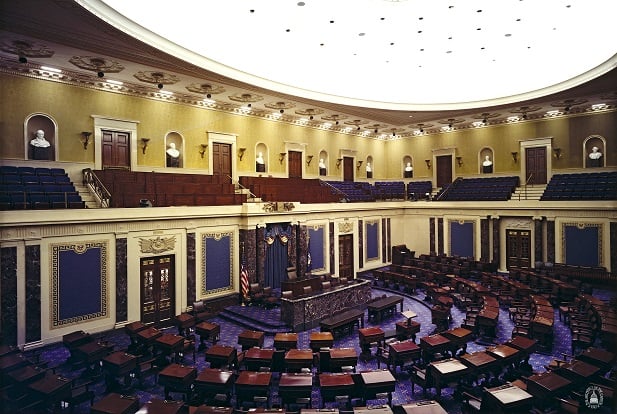 U.S. Senate Chamber. Credit: Architect of the Capitol.
U.S. Senate Chamber. Credit: Architect of the Capitol.
In a 52-48 vote Thursday, the U.S. Senate passed a Congressional Review Act (CRA) resolution to overturn the CFPB rule capping overdraft fees at $5 for the largest financial institutions, handing another blow to the agency and sparking division across the financial sector.
The CFPB’s rule, finalized in December 2024, would have applied only to institutions with more than $10 billion in assets, excluding most credit unions. The agency estimated the rule could save consumers $5 billion annually. However, critics, including the Defense Credit Union Council (DCUC), argued the policy was overly broad and risked unintended harm to credit union members.
Recommended For You
“We thank Chairman Tim Scott for his leadership in bringing this critical reform to the CFPB’s flawed overdraft fee rule,” DCUC President/CEO Anthony Hernandez said. “This resolution affirms that when regulatory agencies exceed their authority or impose policies that harm consumers, Congress must intervene.”
In a letter sent earlier this week, DCUC warned that the CFPB’s approach “jeopardizes the sustainability” of overdraft services and “penalizes the entire financial sector indiscriminately,” failing to distinguish between responsible institutions, like credit unions and large, profit-driven banks.
The CFPB’s rule had exempted smaller credit unions, but DCUC expressed concern that even indirect effects, such as increased compliance pressures or reduced flexibility, could impair credit unions’ ability to serve military families and underserved communities.
“The imposition of a $5 cap on overdraft fees disregards the operational realities of financial institutions,” DCUC wrote to Senate leaders, noting that restrictions could lead to higher non-sufficient funds penalties or fewer safety net options for members.
Of the Senate vote, President/CEO of America's Credit Unions, Jim Nussle, said, “America's Credit Unions supports using all tools available to pull back any overreach of the CFPB's statutory authority. The bureau's overdraft rule is a solution in search of a problem, an attempt to eliminate a product deemed 'unsuitable' by Washington bureaucrats but vital to many credit unions' members. Credit unions are the original consumer protectors that are serving forgotten communities across the country. We appreciate the Senate's action to stop regulatory overreach and preserve necessary financial products and services for hard working Americans."
The resolution now moves to the House, where a companion bill has already advanced through committee. The debate pits supporters of regulatory relief for community institutions against consumer advocates who argue that overturning the rule rewards big banks at the expense of vulnerable households.
© 2025 ALM Global, LLC, All Rights Reserved. Request academic re-use from www.copyright.com. All other uses, submit a request to [email protected]. For more information visit Asset & Logo Licensing.






